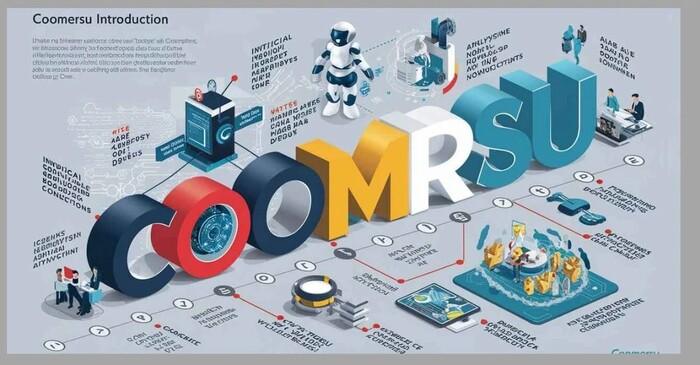Coomersu: Understanding the Blend of Fandom and Consumerism
Introduction: What Is Coomersu and Why It Matters
In today’s digital era, identity and consumer behavior are more intertwined than ever before. The term coomersu, a blend of “coomer” and “consumer**,” has emerged as a way to describe a growing subculture where obsessive fandom, consumption habits, and digital escapism collide.
While it started as internet slang, coomersu now reflects deeper psychological, social, and economic patterns in how people engage with brands, characters, and online media. This article unpacks the concept of coomersu, how it developed, why it matters, and what it reveals about modern consumer behavior.
What Does Coomersu Mean?
The term coomersu is a hybrid of:
-
“Coomer”: A slang term often referring to someone excessively indulging in visual media, especially adult content.
-
“Consumer”: Someone who purchases and engages with products or services, often driven by emotional or identity-based motivations.
Coomersu typically describes individuals—often within fandom communities—who develop a deep emotional attachment to fictional characters or media, resulting in compulsive spending or collecting behaviors. This can include buying:
-
Merchandising (figurines, posters, apparel)
-
Limited-edition or exclusive content
-
Digital assets like NFTs or in-game cosmetics
-
Subscriptions to platforms or creators
At its core, coomersu culture is a reflection of emotional consumption in a hyperconnected world.
The Rise of Coomersu Culture in the Digital Age
The rapid expansion of social media, anime, video games, and creator platforms like OnlyFans and Patreon has created fertile ground for the coomersu phenomenon.
Key Drivers of Coomersu Behavior
-
Parasocial Relationships
Fans often form one-sided emotional bonds with fictional characters or influencers, driving them to support and purchase related content. -
Digital Escapism
Many turn to fictional universes or virtual relationships to escape real-life dissatisfaction, which fuels impulsive buying behaviors. -
Identity Formation
Being a fan of certain characters or franchises becomes part of one’s identity, reinforcing the desire to own related products. -
Algorithmic Influence
Online platforms tailor ads and content to user behavior, intensifying exposure and triggering consumption loops.
Coomersu vs. Healthy Fandom: Where’s the Line?
Not all passionate fans are coomersu, and not all consumerism is unhealthy. The difference often lies in intent and impact.
| Aspect | Healthy Fandom | Coomersu Behavior |
|---|---|---|
| Spending | Intentional and budgeted | Impulsive and excessive |
| Motivation | Appreciation | Escapism or obsession |
| Emotional Impact | Joyful connection | Guilt, dependency |
| Social Interaction | Community building | Isolation |
If your media consumption leads to financial stress, emotional emptiness, or isolation, it might be time to reflect on your habits.
Examples of Coomersu Trends Online
-
Waifu merchandise obsession in anime circles
-
Spending thousands on VTuber donations or exclusive fan content
-
Collecting NSFW digital art or figurines beyond financial means
-
Subscribing to multiple creator platforms despite financial strain
These behaviors reflect a fusion of fantasy, identity, and uncontrolled consumerism—hallmarks of the coomersu mindset.
Coomersu and the Influence of Fandom Economies
Modern fandoms have evolved into fully functioning micro-economies, where creators, platforms, and even fans profit from emotional investment. For example:
-
Gacha games rely on addictive reward systems and character attachment.
-
Streaming platforms promote exclusive fan perks behind paywalls.
-
Online marketplaces thrive on selling limited-edition merchandise.
This system feeds into coomersu behaviors, turning emotional engagement into monetizable consumption.
The Psychology Behind Coomersu
According to consumer psychology, behaviors associated with coomersu are often rooted in:
-
Loneliness and unfulfilled emotional needs
-
Reward-seeking dopamine loops
-
Social comparison pressures
-
Fear of missing out (FOMO)
Brands and platforms are increasingly leveraging psychological triggers to deepen user engagement, making it crucial to be aware of how they influence behavior.
Tips for Managing Coomersu Habits
-
Set a Budget
Treat fan-related purchases like any other expense—track and limit them. -
Question the Why
Ask yourself what need you’re trying to fulfill with each purchase. -
Unplug and Reflect
Reduce time on platforms that trigger compulsive buying. -
Foster Offline Connections
Balance your digital interests with real-world hobbies or socialization. -
Support Creators Mindfully
It’s great to support artists, but not at the expense of your mental or financial health.
Conclusion: Reflecting on Coomersu and Conscious Consumption
Coomersu isn’t just a meme—it’s a mirror reflecting how digital-age consumerism intersects with identity, emotion, and online culture. As fandoms evolve into monetized ecosystems, the line between passion and obsession can blur.
Read More:anon-vault-secure-anonymous-data-storage-explained/
